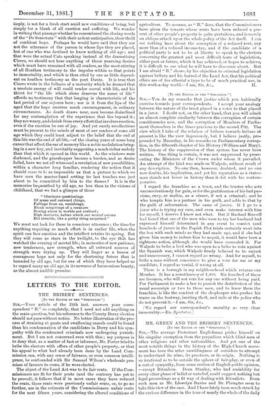[To THE EDITOR OF THE " SPECTATOR. " ] Sin, — You do my
remarks that justice which you habitually exercise towards your correspondents. I accept your analogy between the nature of the trust placed in a voter to that placed in a juror. I doubt not, on the other hand, that you will admit an almost complete similarity between the corruption of certain constituencies now, and the corruption of Members of Parlia- ment themselves in the times previous to the second Pitt. The view which I take of the relation of bribers towards bribees at present is like the view ingeniously, but I believe justly, pro. pounded by Macaulay, in his remarks on Parliamentary corrup- tion, in the fifteenth chapter of his History (William and Mary). The history of the suppression of that system has never been written. One thing is certain, it was not suppressed by prose- cuting the Ministers of the Crown under whom it prevailed. An attempt of the kind was made on Walpole, without result of any description. No one then, however, doubted, and no one now doubts, his implication, and yet his reputation as a states- man stands not lower in history than it did with his contem- poraries.
I regard the franchise as a trust, and the trustee who acts unconscientiously for gain, or for the gratification of his bad pas- sions, envy, or malice, as a sinner, if not a criminal ; and he who tempts him is a partner in his guilt, and adds to that by the guilt of subornation. The same of jurors. If I go to a juror who is trying my case, and even make interest with him for myself, I deserve I know not what. But if Rachael Russell had heard that one of the men who were to try her husband had expressed himself determined in any event to convict (and hundreds of jurors in the Popish Plot trials certainly went into the box with such minds as they had made up), and if she had given him money to induce him to acquit, it would have been a righteous action, although she would have concealed it. For Walpole to bribe a lord who was open to a bribe to vote against the Spanish war, which Walpole firmly believed to be unjust and unnecessary, I cannot regard as wrong. And for myself, to bribe a man without conscience to give a vote for me or my candidate, I regard as venial, if wrong at all.
There is a borough in my neighbourhood which returns one Member. It has a constituency of 1,400. Six hundred of these are freemen, who will not vote for any one without being paid. For Parliament to make a law to punish the distribution of the usual sovereign or two to these men, and to leave them the franchise, is like the conduct of the shopkeeper who pushes his wares on the footway, inviting theft, and rails at the police who
do not prevent it.—I am, Sir, &c., B. [We regard our correspondent's morality as very clear immorality.—En. Spectator.]






































 Previous page
Previous page